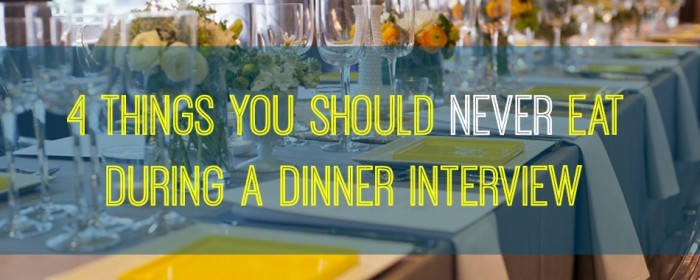Congratulations!
You successfully passed the initial rounds of interviews. Now, it’s just the last step: dinner with the senior executive team.
Dinner interviews are great opportunities for executives to see your people skills and your business etiquette at the same time. They can be your opportunity to seal the deal or career poison if you are not careful.
More and more, job interviews are being conducted over meals to help hiring managers determine how you conduct yourself outside the office. Think about it: When you take out your company’s clients, vendors, and other employees you represent the company and its brand. So, proper dining etiquette and manners are imperative for your career (and your company’s) success.
With this in mind, here are 4 things you should never eat (or drink) during a dinner interview:
1) The most expensive item on the menu – This is not the time to indulge in lobster or filet mignon. Order something you like and that is easy to eat (see #2).
Also, be sure to watch the interviewer and order the same number of courses as s/he.
2) Difficult to eat food – You may love the spaghetti and meatballs at the restaurant, but this is not the time to have it. Stick to the easier to eat menu items that are less likely to drip on your suit.
When ordering, be sure to show your decisiveness. Quickly scan the menu and have a few options. Your interviewer will most likely recommend something to you as well. Make a decision and stick to it. Then shift your attention to the executives.
Also, limit multiple amendments to your order. In other words, go with “I’ll take the Grilled Shrimp Salad” instead of “I’ll take the Grilled Shrimp Salad, without the croutons, with extra tomatoes and with the dressing on the side.”
That said, if you are allergic to a specific food, be sure to let your host know when you RSVP to the event and order around those foods.
This is not the time to order something you have never tasted before. Order something “safe” that isn’t messy to eat, you generally enjoy, and you know how to eat. (i.e., that intriguing, unheard of dish on the menu may come with its own special set of unique utensils you’ve never used before. You don’t want to stress over utensils at an interview.)
3) Your second glass of liquor – Remember, this is an interview, not a time to relax. Your nerves will keep you on your toes, so the best approach is to say no to alcohol. However, if all the executives are having a drink (and you feel comfortable to do so) drinking one glass of wine or alcohol is acceptable.
4) The first bite of food at the table – Wait until everyone else at the table has their food and the most senior person at the table has begun to eat.
Here’s why: It’s simply basic manners to wait for each person at the table to get their meals. In addition, in some cultures, it is disrespectful to eat before the most senior person. So, be on the safe side, and just wait.
Remember, you are not there for the meal, but rather to make a positive impression. If needed, plan to have a small snack before the dinner especially if you will be drinking.
Bonus etiquette tips:
1) No matter how bad the food is, never send it back. Remember, the interviewer picked this place.
2) No doggy bags. It looks awkward and at the end of the evening, you want to be unencumbered when shaking hands.
3) Don’t put used flatware on the table. This is just basic etiquette here. Leave flatware in the 4 o’clock position when finished, knife above the fork with the blade facing you.
4) No need to offer (or reach for the billfold) to pay the bill. Remember, this isn’t a date. The executives invited you and they will most definitely be charging it in. Just remember to say “thank you” as the executive signs the check and then follow up with a thank you note within 24 hours.
In general, professional etiquette is the icing on top of your career cake. For career success, build a strong foundation of your experience, personal brand, and skills and add the extra polish of executive presence and etiquette. Good luck!
If you are looking for a job, ready to make a career change, or just want to feel more confident at work, you must know your personal brand and how to craft it. Not sure what your personal brand is? Check out my free Personal Branding 101 training.
